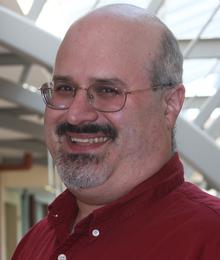Three Neag School of Education faculty members have received what Neag Endowed Professor Jonathan Plucker calls a $65,000 “seed grant” to develop a common language and applied understanding of the Partnership for 21st Century Skill’s (P21) “Four Cs” of creativity, critical thinking, collaboration and communication. These four Cs represent key skills identified by educational, business, and government leaders as essential to successfully tackling rigorous coursework, career challenges, fast-changing technology and a globally competitive workforce.
 The contract provides funding to support the development of research briefs and the writing of collaborative P21/UConn research proposals. “Right now, we’re in phase 1 of the project, which I like to say is planting the seeds of possibility for establishing innovative and impactful research projects,” said Educational Psychology Associate Professor Ron Beghetto, who along with Plucker and Educational Psychology Professor James C. Kaufman were awarded a competitive contract by the Washington, DC-based Partnership for 21st Century Skills.
The contract provides funding to support the development of research briefs and the writing of collaborative P21/UConn research proposals. “Right now, we’re in phase 1 of the project, which I like to say is planting the seeds of possibility for establishing innovative and impactful research projects,” said Educational Psychology Associate Professor Ron Beghetto, who along with Plucker and Educational Psychology Professor James C. Kaufman were awarded a competitive contract by the Washington, DC-based Partnership for 21st Century Skills.
Known as leaders in the field the creativity, Plucker, Kaufman and Beghetto were three of 17 new Neag School professors hired last year as part of UConn’s ambitious, multi-year hiring initiative to expand faculty in key research and teaching areas. Before coming to UConn, the three regularly collaborated on projects, but it was a challenge, because they taught at three different universities—Beghetto at the University of Oregon, Kaufman at California State University at San Bernardino and Plucker, a UConn alumnus, at Indiana University.
Now, however, they have the ability to share not just their own expertise in one physical location, but collaborate with the outstanding students and faculty on staff at the Neag School, Beghetto said.
Plucker, Kaufman and Beghetto will spend the rest of this year compiling and completing the research briefs, which will include executive summaries and overviews of research related to P21’s “Four Cs.”
“We’re working on helping develop a practical understanding of creativity, critical thinking, collaboration and communication,” Beghetto said, “so educators and policymakers are receiving a real tool—a Rosetta Stone of P21’s core concepts, that way we’re all speaking the same language and understanding the same thing.”
“Though often misunderstood, creativity is the cornerstone of P21’s Four Cs,” Beghetto said.
 Most people understand that to be creative, you need to be original. But the part of the definition that tends to get left out is that the original concept also has to be task appropriate,” Kaufman added. “When someone says to you ‘Pave the driveway in a creative way,’ and you say ‘OK, I’ll use salami slices rather than stones,’ that’s not being creative, because cold cuts won’t hold up. When you’re truly being creative, the product is original and it holds up.”
Most people understand that to be creative, you need to be original. But the part of the definition that tends to get left out is that the original concept also has to be task appropriate,” Kaufman added. “When someone says to you ‘Pave the driveway in a creative way,’ and you say ‘OK, I’ll use salami slices rather than stones,’ that’s not being creative, because cold cuts won’t hold up. When you’re truly being creative, the product is original and it holds up.”
“For today’s student, content knowledge is not enough. Life and work environments are evolving so quickly, that both students and teachers need to be able to think not so much out of the box, but creatively within the box,” Beghetto continued. “Creativity can thrive within constraints, and the reality of our education system is that it is constrained. The length of a school day, and the scope of work a teacher can do, is constrained. Same for students. So we’re working to help educators learn how to understand and apply P21’s Four Cs to make teaching and learning better, deeper and more effective”
By December, they’ll have made a blueprint of what is already known about P21’s Four Cs and where future research is needed. This will include identifying ways the Four Cs can be applied to core academic areas like math, science and language, as well as to emerging and increasingly important interdisciplinary ones like global awareness, financial literacy and environmental sustainability.
Because the Partnership for 21st Century Skills is a collaborative that includes leaders from forward-thinking organization like Apple, Crayola, the Ford Motor Company, Intel, the National Education Association, U.S. Fund for UNICEF and Walt Disney Company, Plucker, Kaufman and Beghetto will also be using these resources, and other supports, to identify potential research partners and funders. They’ll also begin to assemble research teams to tackle projects that meet their specific interest and expertise areas, which for Plucker focuses on educational policy, for Kaufman the science and psychology of creativity as a whole, and for Beghetto how to best incorporate creativity in schools and classrooms.
Another goal is to determine how the Four Cs are best measured, something that hasn’t yet been achieved. “It’s exciting work, because it has the potential to have a large and practical impact on the learning and lives of students,” Beghetto continued. “It also puts UConn front and center, leading the way.”
 Facebook
Facebook
 Twitter
Twitter
 LinkedIn
LinkedIn
